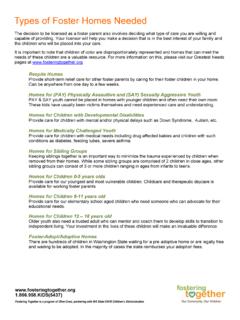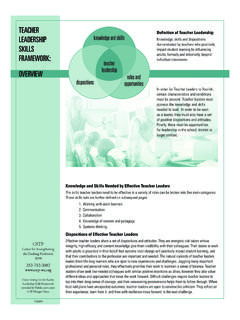Transcription of Positive Adoption Conversations - Fostering Together
1 PositiveAdoption ConversationsEverything you need to know aboutlPositive Adoption Talks at Every AgelExplaining Birthparents & Birth SiblingslTalking with Friends and FamilylExploring Tough TopicslAnswering Questions at SchoolFrom the editors ofAdoptive FamiliesmagazineAn GuideT A L K I N G B A S I C S3 Starting the Adoption ConversationBY FRAN EISENMANHow to set the tone for a lifelong with Children About Adoption BY BARBARA RUSSELL11rules to guide your Adoption s Play Adoption BY SUSAN TOMPKINSC oncrete ways to help young children open : Talking to Your Three- to Five-Year-OldAbout AdoptionBY SUSAN SAIDMAN11 CLIP-AND-SAVE: Talking to Your Six- to Eight-Year-OldAbout Adoption BY SUSAN SAIDMAN13 CLIP-AND-SAVE: Talking to Your Nine- to Twelve-Year-OldAbout Adoption BY SUSAN SAIDMAN15 The Evolving Conversation BY GAIL STEINBERG & BETH HALLK nowing when to lead discussion and when to follow yourchild s Didn t They Keep Me?
2 BY CARRIE KRUEGERWhat your child may ask about birthparents, and how to Questions Every Adopted Teen Wants Answered BY DEBBIE B. RILEY, & JOHN MEEKS, will want more information as they work toresolve their identities. 25 Adoption Workshops BY JULIE MICHAELSC hildren benefit from talking with other adopted E L L I N G T H E T O U G H S T U F F26 The Whole Truth BY REBECCA KLEING uidance and sample language for sharing difficult About Birth SiblingsBY JOEY NESLERC uriosity about biological siblings is healthy and , Bees, and Adoption BY MARYBETH LAMBE, to build reproduction into the Adoption X P L A I N I N G A D O P T I O N A T S C H O O L34 Dear TeacherBY KATHY URBINA & DEB LUPPINOA dapt this letter to educate the teacher about : Helping Classmates UnderstandAdoption BY MARGARET MINTZ & RONNY DIAMOND37 How I Explained Adoption to the First Grade BY AMY KLATZKINWant to give a presentation in your child s classroom?
3 Follow in this mother s D U C A T I N G F A M I L Y A N DF R I E N D S39 How to Explain Adoption to Friends and Family BY LOIS MELINAHelp your loved ones strike the right notes when talking withtheir Say the Strangest Things BY LEONARD FELDER, family with compassion, but hold your an Adoption Ambassador BY SUSAN CAUGHMAN & ISOLDE MOTLEYA quick guide for answering questions from strangers, fromgenuinely interested to merely nosy to G E - B Y - A G E C O N V E R S A T I O N S473-5: Budding Curiosity BY JONI S. MANTELL, LCSWN avigating those first Conversations with your : Big Tummies, Big Questions BY JOANNE SOLCHANY, to respond when a friend s or neighbor s pregnant bellypiques your child s : When Children Notice Race BY MARYBETH LAMBE, about race and diversity with : The Big Questions BY JOANNE SOLCHANY, to eight-year-olds want to know why?
4 556-8: Birthparent Fantasies BY FRAN EISENMANWhat do grade-schoolers think about their birthmothers?569-12: A Growing Awareness BY JONI S. MANTELL, LCSWA doption Conversations during the emotional preteen : When Your Kid Clams Up BY JAYNE SCHOOLERHow to keep the discussion going with a reluctant +: The Other Birthparent BY DEBBIE B. RILEY, teenagers questions about +: Is ThatYour Family? BY DEBBIE B. RILEY, a teen weather prying comments about your I R S T P E R S O N62A Piece at a Time BY STACY CLARKA mother reflects on her daughter s evolving understanding E S O U R C E S63 Conversation Starters BY AFREADERST imeless storybooks that can help children understand cover8 Myths and Realities About AdoptionUse these facts to dispel common Adoption ConversationsAn GuidePOSITIVE Adoption CONVERSATIONS3| talking basicsalking to young childrenabout Adoption is an opportu-nity to shape attitudes andexpand knowledge beforeinfluences outside the family come intoplay.
5 Such discussions build self-esteemand give a sense of safety and security to achild. Every child who was adoptedshould be able to talk about it. This is trueeven in placements where the childresembles the parents and Adoption isnot evident to observers. In such cases,parents are not likely to have Adoption -related Conversations with strangers inpublic places and their children misschances to listen and are concrete see things as black or white, andcannot appreciate the gray areas inbetween. They interpret what is said tothem literally; metaphor and innuendoare lost on them. They do not have theexperience or the abstract thinking to seethe bigger picture. It is no wonder thatparents struggle to find the right words tolaunch this lifelong MomentsSometimes the best way to talk aboutadoption is to use a common experience asa teaching tool. For example, in a walkthrough your neigborhood, you might seea neighbor s new puppy.
6 As your child talksabout how cute the puppy is, you can pointout how young animals, like younghumans, need care day and must protect and shelter might prompt your child to wonderaloud what it might have been like if thepuppy had no one to take it to the veteri-narian, to feed it, and to keep it , you can share your relief and joythat this puppy now has a home and evey-thing it needs to grow up healthy andhappy. Casually, accompanying yourwords with a hug or a quick kiss, you cansay that children need care, too, and thatyou are thrilled to be her mother. Thus, acasual observation about an everydayevent becomes a feel-good lesson aboutadoption for your teachable moments mayoccur when your child notices a pregnantwoman; overhears a comment or isdirectly asked about differences in hisappearance from a parent; or when a newbaby comes home, either by birth oradoption, to a family you know. Usesnuggly times, like bedtime or readingtime, and a calm tone of voice to share thestory of how your child came to beadopted into your family.
7 He ll associatepleasant emotions with the words,creating a foundation for laterexploration of more complex EISENMANis a New England-basedsocial worker with two internationally talks with your child simple and relaxed. Your ease with discussing Adoption lays the groundwork for a lifelong dialogue . Starting the AdoptionConversation Use everydayexperiences to help a young childunderstand what adoptionand caring Adoption Conversations WITH YOUR PRESCHOOLERUse simple language and examples familiar to children (like pets or neighbors).Keep your tone casual and discussion with feel-good actions: snuggles, smiles, Positive Adoption you re questioned by a stranger about your child, say that you d love to chat, adop-tion has been great for your family, but this is not a good time. If appropriate, take theperson s phone number and offer to call later. Your upbeat response lets your childknow the topic is not taboo, while protecting his each Adoption talk with your child with an affirmation of how happy you are tohave adopted FRAN basics |atherine Brunson clearlyremembers the day she learnedshe was adopted.
8 After beingapproached by a classmate atschool, her brother asked their mom aboutadoption. My mom took both of us by the hand,led us into the bedroom, and proceeded totell us the facts of life, she says. She wentthrough the whole thing conception,pregnancy, the birth process, and so on,then segued into how this happened tosomeone else, not to her and Dad. We were looking at each other going, Wow, explains Comical? Perhaps, bytoday s standards. Effective? Definitely,according to Brunson, who says theincident was key in developing her matter-of-fact attitude about Adoption . After that,we were extremely open about the topic inour family. Just like Brunson s mother 30 yearsago, today s adoptive parents face a similarchallenge: helping your children achieve alevel of comfort and confidence with theiradoption. And the most effective way toaccomplish that is by talking to them.
9 Children can t move forward into thefuture unless they have a grasp of whathappened in the past, says Jane Brown, , an Adoption educator, consultant,and author. Talking openly enables themto get their feelings about having beenadopted out on the table. If talking were all about cozy chats bythe fireside, it d be a snap. But many times,it involves fielding a question while you redriving the kids to soccer practice, fendingoff a stranger s comment, or decipheringyour child s angry following techniques, developedby Adoption experts, can make talking alittle easier and a lot more effective whether a heart-to-heart conversation or aspur-of-the-moment talking when your child talks starting in infancy help your child to learn the language ofadoption and to begin to grasp his ownstory. These discussions will benefit bothparent and child.
10 Tell them early and tell them often, says Tom Swanson, a dad to four grownchildren, two adopted domestically andtwo adopted from Korea. His wife, Linda,adds, Part of it was to get us accustomed tousing the words, before they really evenknew what we were talking about. Practice the story in your mind, orrole-play your responses to questions yourchild might s important for partners in a two-parent family to coordinate their stories,says Debbie Riley, executive director of theCenter for Adoption Support andEducation (CASE). They both have to becommitted to talking and sharing thestory, she says. It takes away a lot of thestress. Keep your Conversations devel-opmentally appropriate. Susan Fisherand her coauthor, Mary Watkins, found acommon thread when they interviewedfamilies for their book, Talking with YoungChildren About Adoption .






